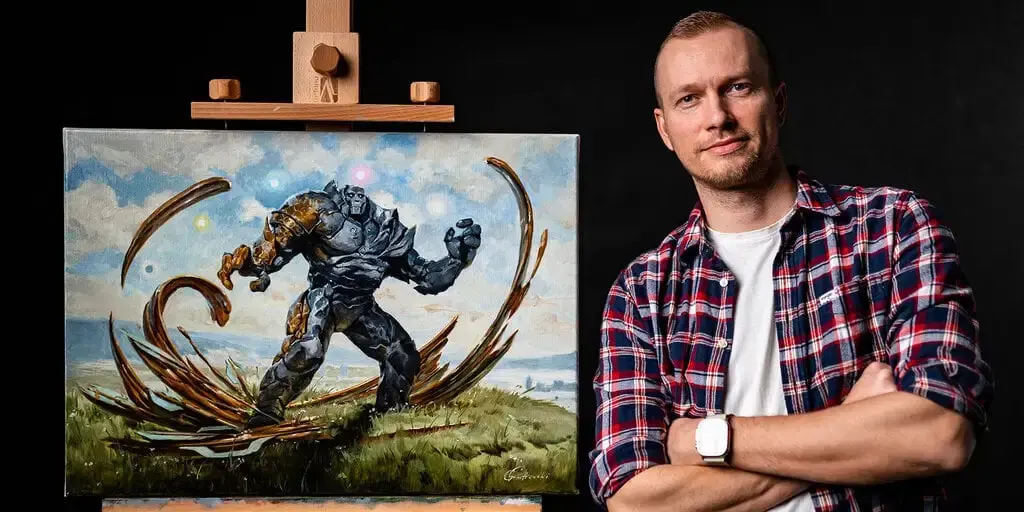Greg Rutkowski, a digital artist known for his surreal style, opposes AI art but his name and style have been frequently used by AI art generators without his consent. In response, Stable Diffusion removed his work from their dataset in version 2.0. However, the community has now created a tool to emulate Rutkowski’s style against his wishes using a LoRA model. While some argue this is unethical, others justify it since Rutkowski’s art has already been widely used in Stable Diffusion 1.5. The debate highlights the blurry line between innovation and infringement in the emerging field of AI art.



They can’t, and “intact” watermarks don’t show up. You’re the one who is misunderstanding how this works.
When a pattern is present very frequently the AI can learn to imitate it, resulting in things that closely resemble known watermarks. This is called “overfitting” and is avoided as much as possible. But even in those cases, if you examine the watermark-like pattern closely you’ll see that it’s usually quite badly distorted and only vaguely watermark-like.
Yes, because “imitate” and “copy” are different things when stealing from someone.
I do understand how it works, the “overfitting” was just laying clear what it does. It copies but tries to sample things in a way that won’t look like clear copies. It had no creativity, it is trying to find new ways of making copies.
If any of this was ethical, the companies doing it would have just asked for permission. That they didn’t says a everything you need to know.
I don’t usually have these kinds discussions anymore, I got tired of conversations like this back in 2016, when it became clear that people will go to the ends of the earth to justify unethical behavior as long as the people being hurt by it are people they don’t care about.
And we’re back to you calling it “stealing”, which it certainly is not. Even if it was copyright violation, copyright violation is not stealing.
You should try to get the basic terminology right, at the very least.
Just because you’ve redefined theft in a way that makes you feel okay about it doesn’t change what they did.
They took someone else’s work product, fed it into their machine then used that to make money.
They stole someone’s labor.
I haven’t “redefined” it, I’m using the legal definition. People do sometimes sloppily equate copyright violation with theft in common parlance, but they’re in for a rude awakening if they intend to try translating that into legal action.
Using that term in an argument like this is merely trying to beg the question of whether it’s wrong, since most everyone agrees that stealing is wrong you’re trying to cast the action of training an AI as something everyone will by default agree is wrong. But it’s not stealing, no matter how much you want it to be, and I’m calling that rhetorical trick out here.
If you want to argue that it’s wrong you need to argue against the actual process that’s happening, not some magical scenario where the AI trainers are somehow literally robbing people.
Taking someone’s work product and converting it, without compensation and consent, into your profit is theft of labor.
Adding extra steps, like, say, training an AI, doesn’t absolve the theft of labor.
We’re it ethical, the companies doing it would have asked for permission and been given cinsent. They didn’t.
> > > Taking someone’s work product and converting it, without compensation and consent, into your profit is theft of labor. > >
That’s not what’s going on here. The finished product contains only the style of the artist that the AI was trained on, and style is not copyrightable. Which is a damn good thing, as humans have been learning from each other’s “work products” and mimicking each others’ styles since time immemorial.
BTW, theft of labor means failing to pay wages or provide employee benefits owed to an employee by contract or law. You’re using that term incorrectly too, Greg Rutkowski wasn’t hired to do anything for the people who trained the AI off of his work.
No, I’m not using it incorrectly, I’m just not concerned with the legal definition as I’m not a lawyer or anyone tied up in this mess.
If you do a thing, and it takes time and skill to do it, then someone copies it, they stole your labor.
Saying they “copied his style”, the style he spent a lifetime crafting, then trying to say they didn’t benefit, at no cost, to the labor he put into crafting that style because “well actually, the law says…” is a bad argument as it tries to minimize what they did.
If their product could not exist without his labor, and they did not pay him for that labor, they stole his labor.
For, like, the fourth time in this thread: were this ethical, they would have asked for permission, they didn’t.
If you’re just going to make up the meanings of words there’s not much point in using them any further.